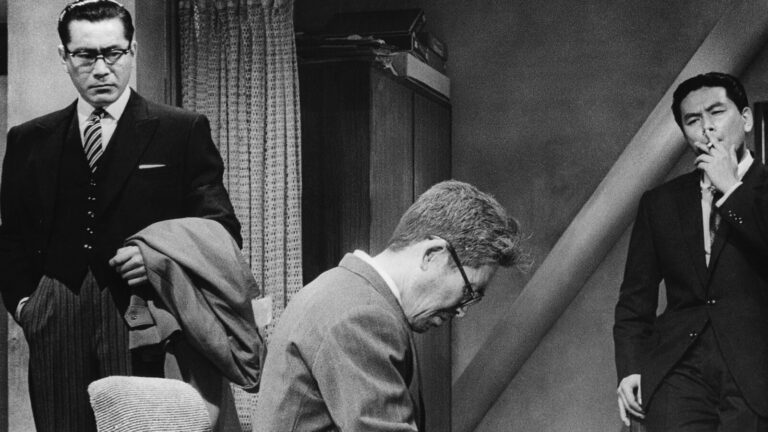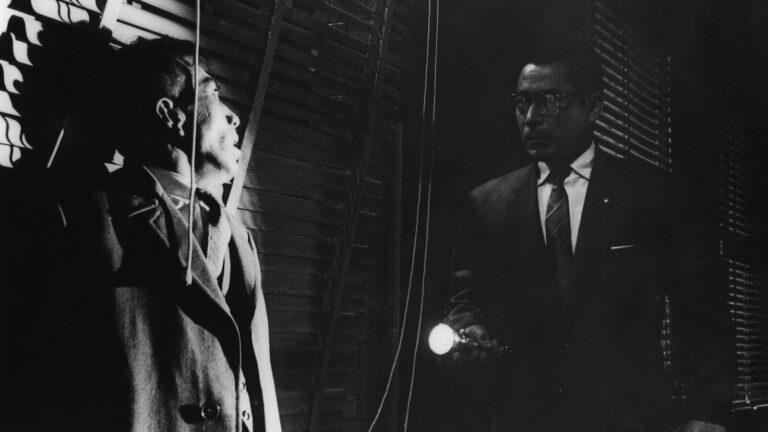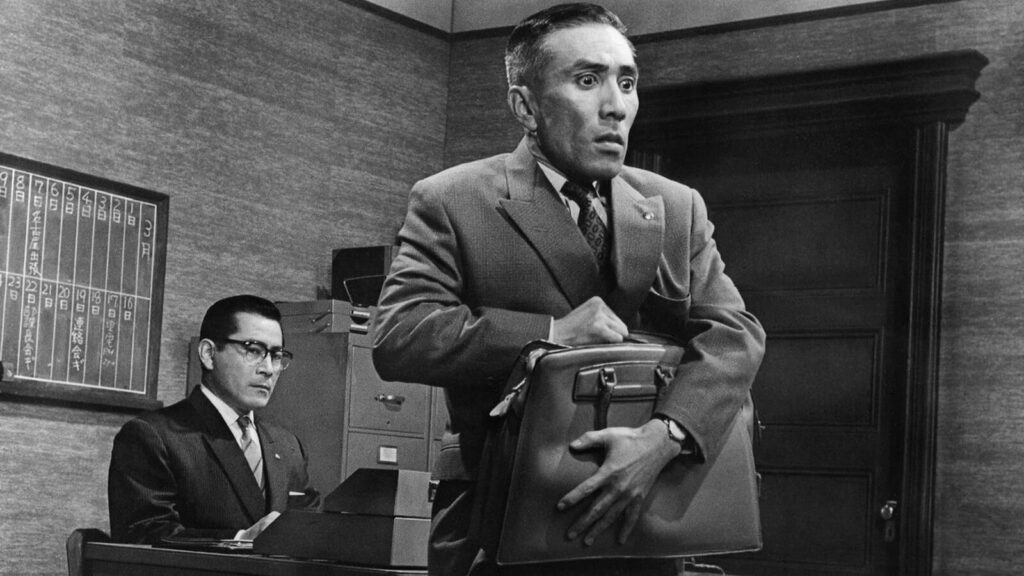9.4/10
FilmFascination Rating
The Bad Sleep Well might just be one of Kurosawa’s finest films — and yes, I know I say that about almost every Kurosawa film. But honestly, can you blame me? Every Kurosawa film has something so distinctly powerful, so utterly unforgettable that it’s impossible not to sing its praises. Whether it’s the breathtaking scale and use of color in Ran, the soul-searching storytelling of Ikiru, or the layered character study in The Bad Sleep Well, Kurosawa never misses a beat. And with this film, he delivers a sharp, cynical, and emotionally devastating take on revenge, corruption, and moral decay.
The film follows Nishi, who has somehow managed to marry Yoshiko, the daughter of the Vice President of the Public Development Corporation. Nishi has only one mission: revenge. He is determined to take down the men responsible for his father’s death, a former Assistant Chief at the corporation. Needless to say, things don’t go as planned. And, again needless to say, we get to be a part of it all.
The film starts with a rather elaborate wedding scene. Quite like ‘The Godfather’, except this movie was released 12 years earlier. And even in this film, this sequence remains such an integral part of the film. The direction mastery comes in by how we are given a seat to hear the gossip of the news reporters that pave the foundation of the plot. Through subtle glances, gossiping reporters, and perfectly timed direction, Kurosawa gives us a crash course in who’s who — a masterclass in exposition that doesn’t feel like exposition at all. By the time the scene wraps, we know the characters, the stakes, and the shadowy world we’re stepping into.
The thing that particularly jumps out when any discussion on this film happens is the characters. They are just too well placed. Their backstories, their motivations, and what they want, all of it is just so well-positioned in the film through actions and dialogue. We connect to the caring side of Tatsuo, the brother of Yoshiko, when we get to know that her disability is because of him. And now he feels that it is his responsibility to ensure that his sister stays happy. We understand how innocent Yoshiko is by the wedding night story that Koichi tells. Then we understand the troubled relationship between Koichi and his father from the story he tells Yoshiko. And there are many such parts in the film where we are allowed to peek into the personal space of each of the characters. And that is what makes us understand them more and connect with them.
Kurosawa, as always, places human emotions at the center. Every action is driven by guilt, vengeance, love, and in many instances, hesitation. It’s this emotional core that keeps us tethered, even as the narrative takes dark turns. If you haven’t watched the film, go watch it. You have ahead of you one of the best cinema experiences out there. Kurosawa with his genius direction, Mifune with another impressive performance, and Takashi Shimura in an unconventional negative role. Mifune gets to show more of his restrained side in this film, unlike Rashomon and Seven Samurai. One unconventional thing is that Mifune isn’t given any noticeable scenes for about the first 30 minutes or so. Imagine something like that happening in today’s films. Today, the protagonist is introduced in the first 5 minutes. Kurosawa certainly had confidence by then. Unfortunately, in a career so great, even such a fine movie gets overlooked.


Let’s just discuss it with the spoilers, shall we?
.
.
The Bad Sleep Well might be the most heart-wrenching tragedy I have seen. Also, one of Kurosawa’s most cynical movies. A film that takes us through everything but ends with us just staring at the credits with a sombre feeling. The main reason it hurts so much is that we live through every twist, every failed plan, every emotional high and crushing low. We feel sad, we are excited at times, anxious many times, and so close to happiness often. Especially near the end, where we think that finally things are getting placed the right way. And that lively background music deceives us into feeling that everything’s now going to be ok. And then, it just doesn’t. And that seems to be a punch in the gut for us, it seems close to being illegal. I mean all movies made today go the way things are “supposed to go” or the way we want them to go (most of the time, the two being the same thing). But when a movie denies that, it just seems so offensive. We want that happy ending. We want to have that closure that suffering people, after all, get what they want (revenge in this case). That just doesn’t happen. “The Bad Sleep Well” is just the perfect title for the film. In fact, the original Japanese title ‘Warui Yatsu Hodo Yoku Nemuru’ translates to ‘The worse a person is, the better they sleep.’ That suits even more.
As the plot unravels, the film only grows more intense. Around the 1 hour 35 minute mark, everything explodes. Secrets that were closely guarded suddenly start breaking out like a forest fire. Everything starts burning, and the people suffering most are the innocent people. There is a dialogue in the film – “If we hesitate, we’re finished”. We lose it all when Wada hesitates. He can’t bear to see the innocent daughter suffer in a plot meant to expose her father.
On the other hand, Iwabuchi—Yoshiko’s father is the epitome of calculated ruthlessness. He doesn’t hesitate, not even when it means sacrificing his own daughter’s well-being. That is the very moment when it just becomes too sad to see. In one haunting moment, he convinces her to drink the very wine laced with the same drugs he had reserved for his own suicide. And then, unable to face himself, he looks away from the mirror — the symbol of conscience — but continues anyway. That’s when the film crosses into the territory of soul-shattering.
Even when Itakura was telling how Koichi had been murdered, I just wanted to listen that all this isn’t true and we still have some way to prove the father’s illicit affairs. The movie bluntly rejects my wishful thinking. But the question is – Does good happen to Iwabuchi after all? Isn’t he just utterly miserable after all? The final scene is among the most powerful in Kurosawa’s filmography. Even as the children abandon their father, telling him this will be the last time they see his face, all he can think about is his future with the company once he returns from that foreign trip. Again, that theme of tragedy is explored at many levels.
So, who’s to blame? The easiest target might seem to be the daughter — naïve, gentle, unaware of the rot surrounding her. But how can we fault someone for their innocence? She simply didn’t know the world could be this cruel. Then, should the blame fall on Wada, for hesitating out of compassion? For choosing humanity over vengeance? Well, the only conclusion that we can settle upon is the brutal truth – ‘The Bad sleep well’.
Join the FilmFascination Club!
All the updates right in your Inbox! (We will never spam you with junk mails)
You will get a message on the top of the form once your subscription is successful.


I like what you guys are up too. Such smart work and reporting! Keep up the excellent works guys I have incorporated you guys to my blogroll. I think it will improve the value of my site 🙂
Howdy! Would you mind if I share your blog with my twitter group? There’s a lot of folks that I think would really enjoy your content. Please let me know. Thank you
I wouldn’t mind at all. The more you share the better!
Thanks for the support.
Thanks for sharing excellent informations. Your site is very cool. I’m impressed by the details that you have on this site. It reveals how nicely you perceive this subject. Bookmarked this website page, will come back for extra articles. You, my pal, ROCK! I found just the information I already searched all over the place and simply could not come across. What an ideal web site.
Thanks 🙂